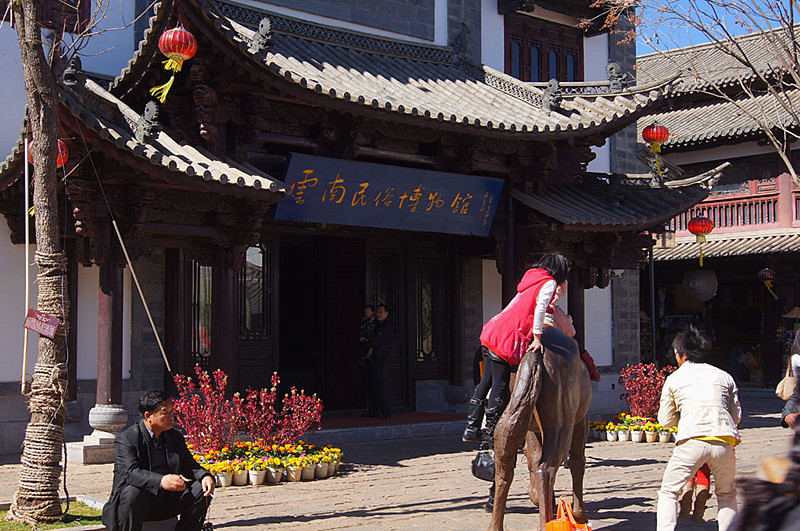
Yunnan Folk Custom Museum
Overview
The Yunnan Folk Custom Museum云南民俗博物馆, located in Yunnan Ethnic Village (云南民族村) on Dianchi Road (滇池路) in Xishan District (西山区) of Kunming (昆明), covers an area of 2,250 square meters, with a building area of 1,350 square meters. This museum specializes in social sciences and folk customs.
Established in 1962, the Yunnan Provincial Cultural Relics Store (云南省文物总店) laid the foundation for cultural preservation. The Yunnan Ethnic Village was opened to the public in 1992, and in 2006, with approval from the Yunnan Provincial Ethnic Affairs Commission (云南省民族事务委员会), the Ethnic Cultural Rescue and Protection Center was founded to collect, research, and utilize the folk cultures of various ethnic groups in Yunnan. The Yunnan Folk Custom Museum officially opened on November 18, 2010. As of 2019, the museum houses over 2,000 items.
Key Details
- Name: Yunnan Folk Custom Museum (云南民俗博物馆)
- Location: Dianchi Road, Xishan District, Kunming, Yunnan Province (云南省昆明市西山区滇池路云南民族村)
- Area: 2,250 m²
- Type: Social sciences and folk custom museum
- Opening Hours: Tuesday to Sunday, 9:30 AM – 5:00 PM
- Admission: Free
Historical Background
- 1962: Yunnan Provincial Cultural Relics Store was established.
- Cultural Revolution: Operations were halted.
- 1976: Business activities resumed.
- 1992: Yunnan Ethnic Village opened.
- 2006: The Ethnic Cultural Rescue and Protection Center was established.
- 2010: Yunnan Folk Custom Museum officially opened.
Museum Layout
Exhibition Halls
The Yunnan Folk Custom Museum features an exhibition area of 2,250 square meters.
Permanent Exhibitions
The museum’s permanent collection is divided into seven sections: Yunnan Religion (云南宗教), Yunnan Blue-and-White Porcelain (云南青花瓷器), Yunnan Ethnic Musical Instruments (云南民族乐器), Yunnan Muleteer Culture (云南马帮文化), Yunnan Folk Crafts (云南民族民间工艺), Yunnan Ethnic Costumes (云南民族服饰), and Yunnan Bronze Ware (云南青铜器). These exhibitions showcase artifacts and artworks related to the daily life, production, and customs of Yunnan’s ethnic groups through various display methods, including images, text, physical objects, and videos.
Thematic Exhibitions
In addition to the permanent displays, the second floor hosts seasonal thematic exhibitions such as “Ethnic Embroidery Exhibition” (民族刺绣展), “Ethnic Calligraphy and Painting Exhibition” (民族书画展), “Intangible Cultural Heritage Works Exhibition” (非遗作品展), and “Folk Photography Exhibition” (民俗摄影展). Temporary exhibitions are held regularly, featuring diverse forms of displays. The museum also features a dynamic display area for representative intangible cultural heritage from Yunnan.
Architectural Features
The museum is situated in a cultural commercial district modeled after ancient Kunming residential architecture. Its overall structure features blue bricks and gray tiles, with intricately carved beams and painted columns that reflect Kunming’s unique residential building culture. In front of the museum lies a square dedicated to the Ancient Tea Horse Road (茶马古道) and muleteer culture sculptures, highlighting rich folk characteristics.
Collections
The museum’s collection includes items acquired through folk solicitation from the Yunnan Ethnic Village and donations from the community, alongside artifacts provided by the Yunnan Provincial Cultural Relics Store for exhibition. As of 2019, the collection totals over 2,000 items.
Notable Artifacts
- Ming Dynasty (明) Jing Shui Kiln Blue-and-White Fish and Algae Pattern Jade Spring Bottle (建水窑青花鱼藻纹玉壶春瓶)
- Modern Era (近代) Dai (傣族) Silver Betel Nut Box (整花银槟榔盒)
- Qing Dynasty (清) Zhaotong Miao Ethnic Costume (昭通苗族服饰)
- Qing Dynasty (清) Ma Jiang Style Bronze Drum (麻江型铜鼓)
- Ming Dynasty (明) Wooden Carved and Painted Black Sky Statue (木雕彩绘大黑天造像)
- Five Dynasties (五代) Stone-carved Buddha Head (石雕佛头)
- Qing Dynasty (清) Elephant Bell (大象铃铛)
- Qing Dynasty (清) Beast Bone Inlaid Lion-patterned Saddle (兽骨镶嵌狮纹马鞍)
Cultural Activities
Promotion and Education
The Yunnan Folk Custom Museum promotes its collections and cultural activities through various channels, including television, the internet, and print media. The museum has also produced documentary films about Yunnan’s folk activities, festivals, and intangible heritage production techniques, serving as a key base for citizens and tourists to understand Yunnan’s ethnic customs and promote patriotic spirit.
Collaborative Efforts
Leveraging resources from Yunnan Ethnic Village and the Yunnan Provincial Cultural Relics Store, the museum has established close cooperative relationships with cultural heritage preservation units across provinces in China and has actively engaged in cultural exchanges with foreign institutions. The museum also engages in ongoing learning exchanges with various museums nationwide.
Significant Events
In 2007, with support from the Yunnan Provincial Department of Culture (云南省文化厅) and the Yunnan Provincial Cultural Relics Appraisal Committee (云南省文物鉴定委员会), the museum hosted the first Yunnan Provincial Ethnic Cultural Artifacts Festival, which included venues in Dali (大理), Yuxi (玉溪), and Jianshui (建水) to collect folk cultural artifacts. This event contributed to the establishment of a display center for ethnic cultural artifacts at Yunnan Ethnic Village, which opened successfully. The Chinese Ancient Ceramics Society held an academic seminar on Yunnan Blue-and-White Porcelain in Kunming, where the museum participated in organizing the event and showcased over a hundred pieces of local blue-and-white porcelain.
Organizational Structure
- Type: Private museum
- Funding Sources: Corporate donations and self-financing
- Departments: Comprehensive Office, Storage Department, Exhibition Department, Security Department
- Staff: 10 employees
- Visitor Services: Intangible cultural heritage souvenirs
- Annual Visitors: The museum receives approximately 400,000 visitors each year.
Visiting Information
Location
The Yunnan Folk Custom Museum is located at Dianchi Road, Xishan District, Kunming, Yunnan Province (云南省昆明市西山区滇池路云南民族村).
Opening Hours
Tuesday to Sunday, 9:30 AM – 5:00 PM.
Admission
Free.
How to Get There
From Kunming Railway Station (昆明站), you can take Metro Line 1 to reach the museum via the A9 bus route.
Travel Tips
- Plan Your Visit: Consider visiting during special exhibitions for unique experiences.
- Photography: Always ask for permission before photographing exhibits or people.
- Cultural Sensitivity: Familiarize yourself with local customs and etiquette, especially during events.
- Souvenirs: Explore the museum gift shop for unique intangible cultural heritage items.



















